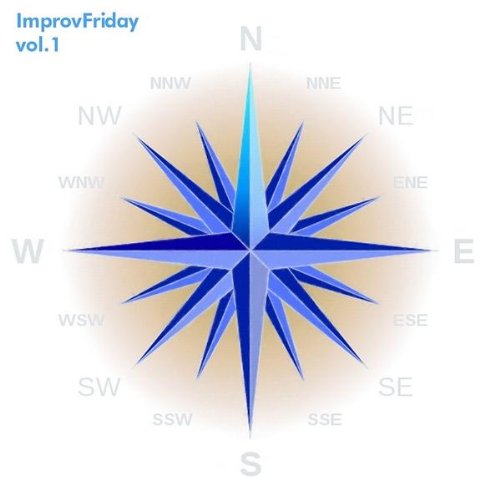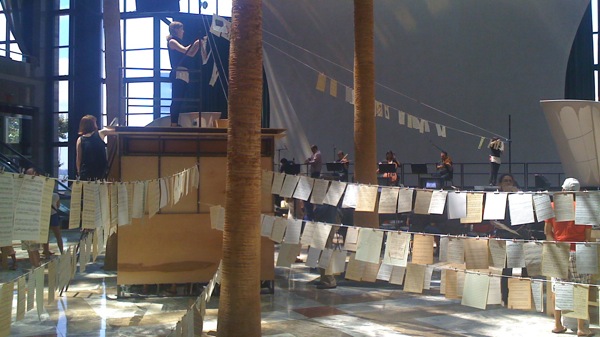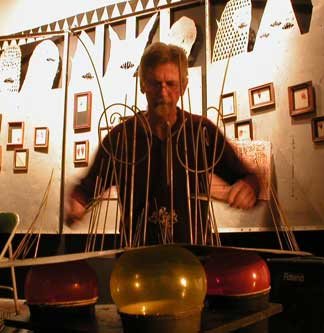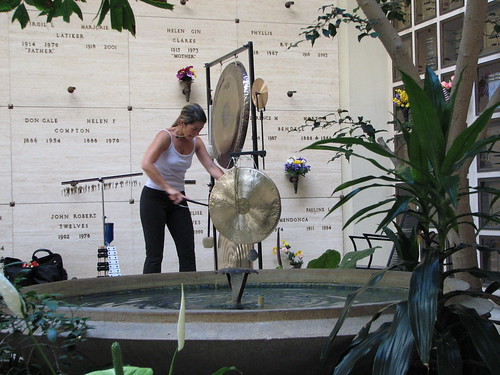The San Francisco Electronic Music Festival celebrates its 10th anniversary this week. On the final festival night, Saturday, September 19th, the program will include a special all-electronic performance of the opera I, Norton, by San Francisco Bay Area composer Gino Robair.
I, Norton is based on the proclamations of Norton I, Emperor of the United States and Protector of Mexico, who lived during the Gold Rush era in San Francisco. The concert begins at 8:00 p.m. at the Brava Theater Center, 2781 24th Street, San Francisco. Tickets are available online from Brown Paper Tickets.
 Gino Robair has created music for dance, theater, gamelan orchestra, radio, and television. His works have been performed throughout North America, Europe, and Japan. He was composer in residence with the California Shakespeare Festival for five years and served as music director for the CBS animated series The Twisted Tales of Felix the Cat. His commercial work includes themes for the MTV and Comedy Central cable networks. Robair is also one of the “25 innovative percussionists” included in the book Percussion Profiles (SoundWorld, 2001). He has recorded with Tom Waits, Anthony Braxton, Terry Riley, Lou Harrison, John Butcher, Derek Bailey, Peter Kowald, Otomo Yoshihide, the ROVA Saxophone Quartet, and Eugene Chadbourne, among many others. He is a founding member of the Splatter Trio and the heavy metal band Pink Mountain. In addition, he runs Rastascan Records, a label devoted to creative music.
Gino Robair has created music for dance, theater, gamelan orchestra, radio, and television. His works have been performed throughout North America, Europe, and Japan. He was composer in residence with the California Shakespeare Festival for five years and served as music director for the CBS animated series The Twisted Tales of Felix the Cat. His commercial work includes themes for the MTV and Comedy Central cable networks. Robair is also one of the “25 innovative percussionists” included in the book Percussion Profiles (SoundWorld, 2001). He has recorded with Tom Waits, Anthony Braxton, Terry Riley, Lou Harrison, John Butcher, Derek Bailey, Peter Kowald, Otomo Yoshihide, the ROVA Saxophone Quartet, and Eugene Chadbourne, among many others. He is a founding member of the Splatter Trio and the heavy metal band Pink Mountain. In addition, he runs Rastascan Records, a label devoted to creative music.
S21: His Imperial Majesty Norton I, Emperor of the United States and Protector of Mexico, is an “only in San Francisco” kind of personage. What inspired you to make him into the central character of an opera?
GR: He’s the kind of complex character one needs for an opera. And I like the fact that he’s mythologized somewhat.
Although many people see him as this incoherent, homeless vagrant, I think the reality is that he was bright man who was determined to make a difference in a world that was hostile, confusing, and often out of control. We’re talking about the Old West, here!
Remember, he was a Jewish immigrant from South Africa. Try to imagine the culture shock he experienced arriving in mid-19th-century California during the Gold Rush. It makes total sense to me that he’d conclude that the only way to solve the problems in his new environment was to roll up his shirt sleeves and do the job himself.
(more…)

 Gino Robair has created music for dance, theater, gamelan orchestra, radio, and television. His works have been performed throughout North America, Europe, and Japan. He was composer in residence with the California Shakespeare Festival for five years and served as music director for the CBS animated series The Twisted Tales of Felix the Cat. His commercial work includes themes for the MTV and Comedy Central cable networks. Robair is also one of the “25 innovative percussionists” included in the book Percussion Profiles (SoundWorld, 2001). He has recorded with Tom Waits, Anthony Braxton, Terry Riley, Lou Harrison, John Butcher, Derek Bailey, Peter Kowald, Otomo Yoshihide, the ROVA Saxophone Quartet, and Eugene Chadbourne, among many others. He is a founding member of the Splatter Trio and the heavy metal band Pink Mountain. In addition, he runs Rastascan Records, a label devoted to creative music.
Gino Robair has created music for dance, theater, gamelan orchestra, radio, and television. His works have been performed throughout North America, Europe, and Japan. He was composer in residence with the California Shakespeare Festival for five years and served as music director for the CBS animated series The Twisted Tales of Felix the Cat. His commercial work includes themes for the MTV and Comedy Central cable networks. Robair is also one of the “25 innovative percussionists” included in the book Percussion Profiles (SoundWorld, 2001). He has recorded with Tom Waits, Anthony Braxton, Terry Riley, Lou Harrison, John Butcher, Derek Bailey, Peter Kowald, Otomo Yoshihide, the ROVA Saxophone Quartet, and Eugene Chadbourne, among many others. He is a founding member of the Splatter Trio and the heavy metal band Pink Mountain. In addition, he runs Rastascan Records, a label devoted to creative music.

 I’ve been working so hard today I’ve forgotten to eat, and it’s in that spirit of lightheadedness and poor impulse control that I share with you the following San Francisco Bay Area new music scene update.
I’ve been working so hard today I’ve forgotten to eat, and it’s in that spirit of lightheadedness and poor impulse control that I share with you the following San Francisco Bay Area new music scene update. The San Francisco Bay Area has a unique way of celebrating the first day of summer. Our most popular new music event, the
The San Francisco Bay Area has a unique way of celebrating the first day of summer. Our most popular new music event, the  San Francisco is famous for its innovations, its open minds, and its spirit of protest. In 2005, according to
San Francisco is famous for its innovations, its open minds, and its spirit of protest. In 2005, according to  We’ve reached the final concert of
We’ve reached the final concert of  Interpretations continues its twentieth season of provocative programming in New York City. Founded and curated by baritone Thomas Buckner in 1989, Interpretations focuses on the relationship between contemporary composers from both jazz and classical backgrounds and their interpreters, whether the composers themselves or performers who specialize in new music. To celebrate, Jerry Bowles has invited the artists involved in this season’s concerts to blog about their Interpretations experiences. The concert on 12 March 2009 is a recital by the producer himself, baritone Thomas Buckner. He took time out of his
Interpretations continues its twentieth season of provocative programming in New York City. Founded and curated by baritone Thomas Buckner in 1989, Interpretations focuses on the relationship between contemporary composers from both jazz and classical backgrounds and their interpreters, whether the composers themselves or performers who specialize in new music. To celebrate, Jerry Bowles has invited the artists involved in this season’s concerts to blog about their Interpretations experiences. The concert on 12 March 2009 is a recital by the producer himself, baritone Thomas Buckner. He took time out of his